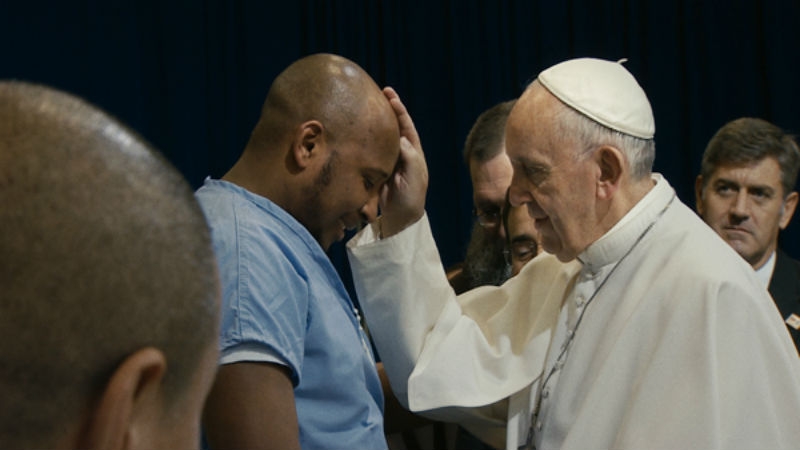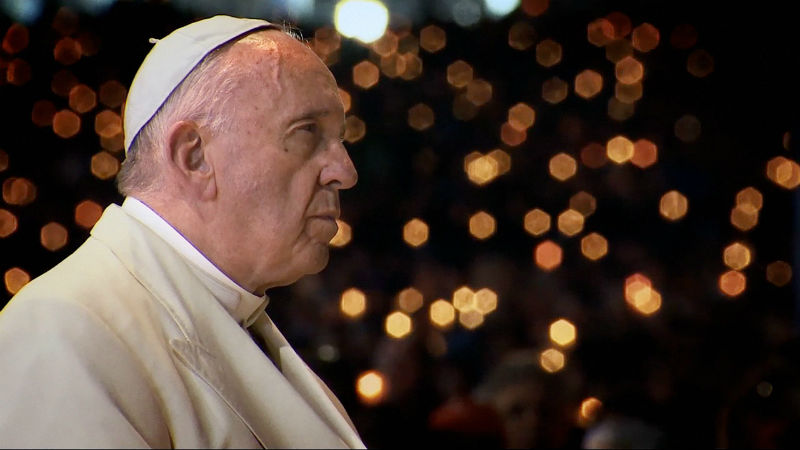Days are barely different for 50-something-year-old Hirayama (Koji Yakusho). He wakes up in his nondescript little flat somewhere in suburban Tokyo, jumps on his van, pops a cassette in and listens to Western music on his way to work. His job consists of cleaning public toilets. Scrubbing the rim of the bowls and urinals, wiping the mirrors, polishing the faucets, mopping the floor, and little more than that. He carries out his duties undaunted, without a sense shame and a trace of hesitation. And without moaning. In fact, the unmarried, childless and friendless man barely talks.
Hirayama does not seek compassion. He’s perfectly happy in his own company. This is not a film about an eccentric, awkward or repulsive misfit worthy of our pity. Our protagonist does not live a dysfunctional existence. He is introverted however pleasant to be around, one of those avuncular figures with a shy and honest smile. And this is not poverty porn, either. Hirayama’s house – despite being very humble – is very clean and comfortable. Our protagonist sleeps comfortably surrounded by piles of the audio cassettes which he cherishes so much. The old tapes are now back in fashion and worth a fortune, his young and bubbly apprentice Takeshi tells him. But he has no interest in selling them. Our protagonist is not keen on money. He does not want to change anything in his simple and gentle little world.
This is a film dotted with small moments of intense redemption. Hirayama attends the local public shower, where he treats himself to a jacuzzi session with men around his age with whom he does not engage. He simply shuts his eyes and enjoys himself. He also frequents the local bar, apparently some sort of brothel. This is where he becomes most talkative, sharing a joke and perhaps even flirting with the bartender. Invaluable snippets of joy. We eventually learn that Hirayama has a family, and a fraught relationship with some of his closest relatives. Yet it is him that his niece Niko seeks after running away from home. A short reunion with an estranged sibling provides one of the most powerful scenes. We are given some insight as to what may have happened, but are left to put the final puzzle pieces together ourselves. This is not a film with sudden twists and shocking revelations, yet it’s bursting with emotion.
Music is an integral part of Perfect Days. It is in his car that Hirayama achieves his most intense state of being, allowing rock and jazz songs to fill his life with rhythm and tender exhilaration. A genuine catharsis. He shares these precious moments with anyone who jumps on the passenger seat (such as Takeshi, Takeshi’s girlfriend and Niko). Highlights include Patti Smith’s Redondo Beach, The Kinks’ Lazy on Sunny Afternoon, Nina Simone’s Feeling Good, Lou Reed’s Pale Blue Eyes and Perfect Day, and Van Morrison. Wim Wenders has an intimate connection with music, having directed a few music documentaries (such as Buena Vista Social Club in 1999, and Berlin Philharmonic in 2014), and populated many of his fiction films with exquisite songs.
With Perfect Days, the 77-year-old German director returns to what he mastered at the beginning of his career: quiet, reflexive and deeply humanistic dramas. He had long abandoned such films in favour of documentaries and more mainstream flicks. His latest features Every Thing Will Be Fine (2015) and Submergence (2017) are fairly formulaic and conventional blockbusters, and they both bombed. We should roll the red carpet for our good and ol’ Wim Wenders. This is a much welcome return to the roots!
Perfect Days premiered in the Official Competition of the 76th Cannes Film Festival, when this piece was originally written. Wim Wenders won the Best Director prize, while Koji Yashuko won Best Actor. The film shows in September in San Sebastian, the BFI London Film Festival in October, and the Tallinn Black Nights Film Festival. In cinemas on Friday, February 23rd.










